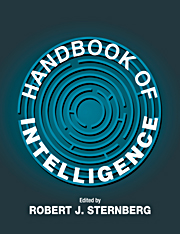Book contents
- Frontmatter
- Contents
- Preface
- Contributors
- PART I THE NATURE OF INTELLIGENCE AND ITS MEASUREMENT
- PART II DEVELOPMENT OF INTELLIGENCE
- PART III GROUP ANALYSES OF INTELLIGENCE
- PART IV BIOLOGY OF INTELLIGENCE
- 10 Animal Intelligence
- 11 The Evolution of Intelligence
- 12 The Neuropsychology and Psychophysiology of Human Intelligence
- PART V INTELLIGENCE AND INFORMATION PROCESSING
- PART VI KINDS OF INTELLIGENCE
- PART VII TESTING AND TEACHING INTELLIGENCE
- PART VIII INTELLIGENCE, SOCIETY, AND CULTURE
- PART IX INTELLIGENCE IN RELATION TO ALLIED CONSTRUCTS
- Author Index
- Subject Index
12 - The Neuropsychology and Psychophysiology of Human Intelligence
Published online by Cambridge University Press: 05 June 2012
- Frontmatter
- Contents
- Preface
- Contributors
- PART I THE NATURE OF INTELLIGENCE AND ITS MEASUREMENT
- PART II DEVELOPMENT OF INTELLIGENCE
- PART III GROUP ANALYSES OF INTELLIGENCE
- PART IV BIOLOGY OF INTELLIGENCE
- 10 Animal Intelligence
- 11 The Evolution of Intelligence
- 12 The Neuropsychology and Psychophysiology of Human Intelligence
- PART V INTELLIGENCE AND INFORMATION PROCESSING
- PART VI KINDS OF INTELLIGENCE
- PART VII TESTING AND TEACHING INTELLIGENCE
- PART VIII INTELLIGENCE, SOCIETY, AND CULTURE
- PART IX INTELLIGENCE IN RELATION TO ALLIED CONSTRUCTS
- Author Index
- Subject Index
Summary
Since the time of Sir Francis Galton and throughout the 20th century, numerous researchers interested in human intelligence have attempted to identify its biological bases. Some of these attempts have seemed promising at first but have either failed to replicate or have not been pursued for one reason or another; others have yielded a more consistent and reliable pattern of results.
In this chapter, four approaches to the investigation of biological correlates of intelligence are described covering (1) anatomical or structural head size and brain volume estimates, (2) psychophysiological event-related potentials, (3) nerve conduction velocity, and (4) cerebral glucose metabolic rates. These are not the only approaches that have been taken to investigate the biology of intelligence, but their description should suffice to give an introduction to the area; coverage of such additional topics as biochemical factors and molecular genetic studies of quantitative trait loci may be found in Vernon (1993a, 1997).
One of the most interesting findings from studies in these areas is the extent to which completely noncognitive measures correlate with performance on complex problem-solving and intelligence tests. Offsetting these encouraging empirical results, however, has been a relative dearth of sound theory development. A substantial amount is currently known about which biological and physiological measures and mechanisms correlate with intelligence, but the functional significance of many of these correlations largely remains unclear. One of the central challenges for scientists who pursue the search for the biological bases of human intelligence will be to integrate their findings into a cohesive explanatory framework that goes beyond the correlational and incorporates causational and theoretically compelling substance.
- Type
- Chapter
- Information
- Handbook of Intelligence , pp. 245 - 264Publisher: Cambridge University PressPrint publication year: 2000
- 49
- Cited by



